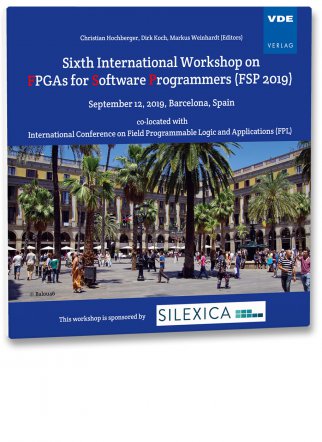Hochberger, Christian; Koch, Dirk; Weinhardt, Markus (Hrsg.)
Sixth International Workshop on FPGAs for Software Programmers (FSP 2019)
September 12, 2019, Barcelona, Spain co-located with International Conference on Field Programmable Logic and Applications (FPL)
2019, VIII, 60 Seiten, 140 x 124 mm, Slimlinebox, CD-Rom
ISBN 978-3-8007-5045-0, E-Book: ISBN 978-3-8007-5046-7
Persönliche VDE-Mitglieder erhalten auf diesen Titel
10% Rabatt
The FSP Workshop aims at bringing researchers and experts from both academia and industry together to discuss and exchange the latest research advances and future trends.This includes high-level compilation and languages, design automation tools that raise the abstraction level when designing for (heterogeneous) FPGAs and reconfigurable systems and standardized targetplatforms.This will in particular put focus on the requirements of software developers and application engineers.In addition, a distinctive feature of the workshop will be its cross section through all design levels, ranging from programming down to custom hardware.Thus, the workshop is targeting all those who are interested in understanding the big picture and the potential of domain-specific computing and software-driven FPGA development.In addition, the FSP Workshop shall facilitate collaboration of the different domains.
Topics of the FSP Workshop include, but are not limited to:
• High-level synthesis (HLS) and domain-specific languages (DSLs) for FPGAs and heterogeneous systems
• Mapping approaches and tools for heterogeneous FPGAs
• Support of hard IP blocks such as embedded processors and memory interfaces
• Development environments for software engineers (automated tool flows, design frameworks and tools, tool interaction)
• FPGA virtualization (design for portability, resource sharing, hardware abstraction)
• Design automation technologies for multi-FPGA and heterogeneous systems
• Methods for leveraging (partial) dynamic reconfiguration to increase performance, flexibility, reliability, or programmability
• Operating system services for FPGA resource management, reliability, security
• Target hardware design platforms (infrastructure, drivers, portable systems)
• Overlays (CGRAs, vector processors, ASIP- and GPU-like intermediate fabrics)
• Applications (e.g., embedded computing, signal processing, bio informatics, big data,database acceleration) using C/C++/SystemC-based HLS, OpenCL, OpenSPL, etc.
• Directions for collaborations (research proposals, networking, Horizon 2020)
Dirk Koch (Co-Chair) is a lecturer in the Advanced Processor Technologies Group at the University of Manchester. His main research interests are on run-time reconfigurable systems based on FPGAs, embedded systems, computer architecture and VLSI. Dirk developed techniques and tools for self-adaptive distributed embedded control systems based on FPGAs. Current research projects include database acceleration using FPGAs-based stream processing, HPC and exascale computing, as well as reconfigurable instruction set extensions for CPUs using embedded FPGAs. Furthermore, in the FORTE project he is exploring how memristors can be used for building new kinds of analogue, digital and mixed-signal reconfigurable devices.
Dirk Koch is author of the book "Partial Reconfiguration on FPGAs" and a co-editor of the book "FPGAs for Software Programmers" and his group is developing and maintaining the GoAhead framework that provides unique capabilities for building run-time reconfigurable systems.
Markus Weinhardt (Co-Chair, Osnabrück University of Applied Sciences, Germany) received his diploma in informatics and his doctorate in engineering in 1992 and 1997, respectively, both from the Technical University Karlsruhe (Germany). He is a member of the IEEE and holds a professorship for "Hardware and Software Systems for Information Processing" at Osnabrück UAS, Germany. His main research interests are high-level compilation methods for reconfigurable architectures (including FPGAs and Coarse-Grain Reconfigurable Arrays), reconfigurable and parallel processor architectures, and image processing. Markus has (co-)authored more than 30 conference papers, journal publications and book chapters and holds several patents. He currently serves on the program committees of several international conferences (FPL, ARC, ReConFig) and served as reviewer for several international journals (ACM TRETS, Hindawi IJRC, Optimization Letters).


